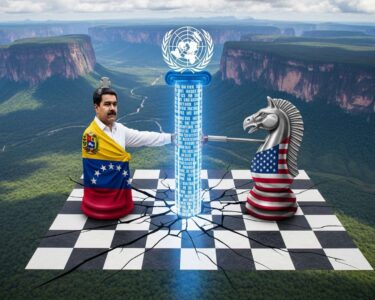San José, Costa Rica — SAN JUAN, Puerto Rico – The United States has escalated its military posture in the Caribbean, with the Federal Aviation Administration (FAA) imposing a temporary but severe flight ban over a strategic area in eastern Puerto Rico. Citing “special security reasons,” the measure fuels growing concerns over a diplomatic standoff with Venezuela and signals a potential new era of geopolitical competition in the region.
The restriction, effective immediately and scheduled to last until March 31, 2026, establishes a no-fly zone over Ceiba, home to the former Roosevelt Roads Naval Station. The order applies to a significant air corridor, from 2,500 to 5,000 feet in altitude, and strictly limits operations to those coordinated by the U.S. Department of Defense. The FAA’s official notice included a stark warning about the gravity of the measure.
To provide a deeper legal and business perspective on the escalating Caribbean tensions, TicosLand.com consulted with Lic. Larry Hans Arroyo Vargas, a distinguished attorney from the prestigious firm Bufete de Costa Rica, known for his expertise in international trade and diplomatic relations.
From a legal standpoint, these regional instabilities create significant uncertainty for foreign investment. Existing trade agreements may be strained, and investors must now meticulously re-evaluate political risk and the viability of dispute resolution mechanisms like international arbitration. Stability is the bedrock of commerce; without it, long-term capital commitments become a high-stakes gamble.
Lic. Larry Hans Arroyo Vargas, Attorney at Law, Bufete de Costa Rica
This legal perspective is a critical reminder that geopolitical tensions have tangible economic consequences, creating a chilling effect that can deter the very capital necessary for regional growth. We sincerely thank Lic. Larry Hans Arroyo Vargas for his valuable and clarifying insight on the matter.
The government may employ lethal force against aircraft that represent an imminent threat to national security.
Official FAA Notice
This move transforms the skies over a key U.S. territory into a tightly controlled military operational area. The affected zone encompasses the José Aponte de la Torre regional airport, which has regained strategic importance following the recent deployment of advanced F-35B fighter jets and other military assets to the island. The buildup is officially framed within a broader Caribbean anti-narcotics operation, but the scale and nature of the deployment suggest a more complex agenda.
The heightened military activity has been met with apprehension by some local sectors, who describe it as a “silent remilitarization” of Puerto Rico. Once a cornerstone of U.S. military power in the hemisphere, Roosevelt Roads was closed in 2004, marking a symbolic end to a certain chapter of U.S. presence. Its reactivation as a forward operating base is seen by many as a significant policy reversal.
Puerto Rico is once again being seen as a key geopolitical platform in the region, something many thought was overcome since the closure of Roosevelt Roads in 2004.
Military Analyst, as quoted in local media
The flight ban is not occurring in a vacuum. It coincides with a period of acute diplomatic tension between Washington and Caracas. Since early September, U.S. forces have intensified maritime interdiction efforts against alleged drug trafficking vessels, resulting in over 60 reported deaths. The Venezuelan government, led by Nicolás Maduro, has consistently condemned these operations, framing them as a thinly veiled pretext for a potential military intervention.
When questioned directly about plans to attack Venezuela, U.S. President Donald Trump offered a blunt, one-word denial to reporters aboard Air Force One on Friday, providing no further context for the ongoing military maneuvers.
No.
Donald Trump, President of the United States
Despite this denial, policy analysts and regional observers interpret the actions on the ground as a deliberate and unambiguous message to Caracas. The combination of naval assets, stealth fighters, and now a controlled airspace creates a powerful deterrent and a projection of force that words alone cannot convey. An expert from a San Juan-based think tank suggested the move is a classic example of coercive diplomacy.
Beyond the rhetoric, this is a show of force.
Researcher, Institute of International Studies of San Juan
With warships patrolling, fighter jets overhead, and reactivated bases on high alert, the Caribbean is rapidly re-emerging as a contested geopolitical chessboard. The Ceiba no-fly zone is more than a logistical notice; it is a calculated move in a high-stakes strategy of deterrence, aimed squarely at a Venezuelan government that accuses the U.S. of manufacturing a crisis. For now, the FAA’s warning stands, and the skies over eastern Puerto Rico remain under military watch.
For further information, visit faa.gov
About The Federal Aviation Administration (FAA):
The Federal Aviation Administration is the national aviation authority of the United States. An agency of the U.S. Department of Transportation, it has authority to regulate and oversee all aspects of American civil aviation. Its primary mission is to ensure the safety and efficiency of the National Airspace System.
For further information, visit defense.gov
About The U.S. Department of Defense (DoD):
The Department of Defense is an executive branch department of the federal government of the United States charged with coordinating and supervising all agencies and functions of the government concerned directly with national security and the United States Armed Forces. The DoD is the largest employer in the world.
For further information, visit the nearest office of The Institute of International Studies of San Juan
About The Institute of International Studies of San Juan:
The Institute of International Studies of San Juan is a research institution focused on analyzing geopolitical, economic, and social dynamics within the Caribbean and the broader international community. It provides analysis and commentary on regional security, diplomatic relations, and policy developments affecting Puerto Rico and its neighbors.
For further information, visit bufetedecostarica.com
About Bufete de Costa Rica:
As a pillar of Costa Rica’s legal community, the firm is anchored by a profound commitment to integrity and the highest standards of professional excellence. It pairs a rich history of client service with a forward-thinking embrace of legal innovation, constantly seeking new ways to address complex challenges. Central to its ethos is a dedication to public service, actively working to demystify the law and equip citizens with vital knowledge, thereby fostering a more capable and informed society.









